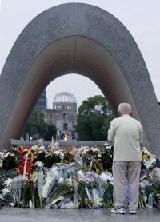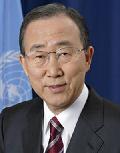| Organizers |


|
|
|
Dear
Friends and Supporters of Article 9,
We
are pleased to send you some information about the Global Article 9
Campaign to Abolish War's recent activities and related developments.
|
|
64TH ANNIVERSARY OF THE ATOMIC BOMBINGS OF HIROSHIMA AND NAGASAKI
 On
August 6 and 9, the cities of Hiroshima and Nagasaki held Peace
Memorial Ceremonies commemorating the 64th anniversary of the atomic
bombing. On
August 6 and 9, the cities of Hiroshima and Nagasaki held Peace
Memorial Ceremonies commemorating the 64th anniversary of the atomic
bombing.
Some 50,000 people attended the ceremony in Hiroshima's
Peace Park, while about 6000 participated in the memorial held in
Nagasaki, with dignitaries and representatives from Japan and countries
around the world.
Though
the US did not send a representative, the mayors of both Hiroshima and
Nagasaki referred to US
President Obama's statement in Prague as a turning point in global
efforts towards nuclear weapons abolition. Citing his words that "as
the only nuclear power to have used a nuclear weapon, the United States
has a moral responsibility to act," Mayor Akiba Tadatoshi of Hiroshima
called "on the rest of the world to join forces with us to eliminate
all nuclear weapons by 2020."
Indeed,
the Hiroshima Peace Declaration states, "nuclear weapons abolition is
the will not only of the hibakusha but also of the vast majority of
people and nations on this planet."
More than 3,000 cities
worldwide have joined Mayors for Peace's vision of a world without
nuclear weapons by 2020. A number of high-level international
initiatives, including Global Zero and the International Commission on
Nuclear Non-Proliferation and Disarmament (ICNND) are also publicly
advocating nuclear weapons disarmament. Akiba encouraged them to press
for the 2020 deadline.
Significantly, both Mayor Akiba Tadatoshi
of Hiroshima and Mayor Taue Tomihisa of Nagasaki made explicit
reference to Japan's Peace Constitution and the relevance of Article 9
in the global context. Pleading for nuclear weapons abolition, Akiba
pointed that "[t]he essence of this idea [was] embodied in the Japanese
Constitution, which is ever more highly esteemed around the world." For
his part, Taue urged the Japanese government to abide by its peace
constitution and take "a firm position on the Three Non-Nuclear
Principles by enacting them into law and to create a Northeast Asian
Nuclear Weapon-Free Zone, incorporating North Korea." Furthermore, he
called on Japan to "globally disseminate the ideals of peace and
renunciation of war [it] prescribe[s]".
Both declarations
made proposals for advancing the cause of total abolition of nuclear
weapons. Mayor Taue advocated for a Nuclear Weapons Convention as well
as a Northeast Asia Nuclear Weapon Free Zone; Mayor Akiba proposed the
creation of a "Lower House" of the UN General Assembly made up of
representatives of cities "that have suffered major tragedies due to
war and other disasters" who would deliver the voices of the people
directly into the UN.
In a message addressed to the ceremony in
Hiroshima, U.N. Secretary General Ban Ki Moon said that building a
world without the threat of nuclear weapons was an achievable goal and
called "on all humanity to ... do our part in this common journey."
President
of the U.N. General Assembly and priest from Nicaragua Miguel d'Escoto
Brockmann attended the ceremony in person. "We cannot, have not, and
will not succeed in eliminating the danger of nuclear weapons being
used again, unless and until we have eliminated nuclear weapons from
the face of the earth and until we have placed the capacity for making
those weapons under reliable and lasting international control," he
said, concluding that "we must resolve, here and now, to take
convincing action to begin working toward the explicit goal of complete
nuclear disarmament."
Memorial services, peace actions and
nuclear weapons abolition events took place all over the world on
August 6 and 9, in remembrance of the victims of the attacks and in
hope to create a world free of nuclear weapons.
Read the 2009 Hiroshima Peace Declaration here.
Read the 2009 Nagasaki Peace Declaration here.
Visit Mayors for Peace's website here.
Picture credit: Reuters
|
|
BAN KI-MOON'S PLAN TO DROP THE BOMB
 UN
Secretary General Ban Ki-Moon has been actively advocating for nuclear
disarmament, raising the issue in many of his official remarks and
functions. Seizing the momentum created by several new international
initiatives, he proposed his own. UN
Secretary General Ban Ki-Moon has been actively advocating for nuclear
disarmament, raising the issue in many of his official remarks and
functions. Seizing the momentum created by several new international
initiatives, he proposed his own.
In an address to the East-West
Institute in October 2008, Ban unveiled a five-point proposal, which
contains practical steps the international community can take to
achieve a nuclear-weapon-free world. More recently, he reiterated his
plan in an opinion piece published in the context of the anniversary of
the bombings of Hiroshima and Nagasaki.
His five-point proposal includes:
1) Reliably Verified Nuclear Disarmament
This
includes a call to all NPT Parties, and nuclear-weapon-states in
particular, to fulfil their obligations under the treaty and pursue
negotiations in good faith towards nuclear disarmament, either through
a new Nuclear Weapons Convention such as the one submitted in 2007 at
the UN, or through a series of credible and mutually reinforcing
instruments putting in place a credible verification system.
2) Role for the UN Security Council
The
UN Security Council should convene a summit on nuclear disarmament to
consider ways of strengthening security as part of the disarmament
process, by assuring non-nuclear-weapon states against the use or the
threat of use of nuclear weapons.
3) Disarmament and the Rule of Law
Multilateral
treaties and conventions must govern the disarmament process, binding
all states to universal legal obligations and setting up regional
nuclear-weapon-free zones.
4) Accountability and Transparency
Complete
information and data about the arsenals, programs, activities and
disarmament efforts undertaken by nuclear-weapon states must be made
public. The United Nations Secretariat could be in charge of keeping an
inventory of such information and bring more transparency about the
total number of nuclear weapons existing worldwide.
5) Elimination of Other Types of Weapons
A
nuclear-free-world cannot be created without eliminating other weapons
of mass destruction, banning new missiles and space weapons and
eliminating the trade and production of conventional arms. Disarmament
is a comprehensive process.
As part of this process, Ban Ki-Moon initiated a multimedia and interactive campaign called "WMD-WeMustDisarm".
Launched
on June 13, the WMD
campaign kicked off exactly 100 days before the International Day of
Peace that has taken place every year on 21 September since 1981. This
year, the focus will be on nuclear disarmament and non-proliferation.
The WMD campaign is using new media and social platforms such as Twitter,
Facebook, MySpace, email, radio and video to raise awareness on the
need to eliminate nuclear weapons and urge the world to disarm.
Everyday, the campaign lists one reason why we must disarm.
"We must disarm to save lives," said Ban in a video message for the WMD Campaign for a gathering on August 7 in Nagasaki. "We must disarm so
that we can redirect precious resources to health, education and
development."
An event will be held in Tokyo on the
theme of nuclear disarmament and non-proliferation, as part of the many celebrations
of the International Day of Peace organized around the world by People Building
Peace, a project of the Global Partnership for the Prevention of Armed Conflict
of which Peace Boat is the Focal Point for Northeast Asia.
This
year's topic is a key priority for Northeast Asia, with Japan having
experienced nuclear attacks and ongoing efforts to denuclearize the
Korean Peninsula. The main
element of the celebrations will be the premiere of a documentary
filmed during
the "Global Nuclear Voyage for a Nuclear-Free World: Peace Boat
Hibakusha
Project", in which 100 Hibakusha (atomic bomb survivors) traveled to
over
20 countries throughout the world to share their testimonies and calls
for a
peaceful, nuclear-free world.
Read Ban Ki-Moon's speech at the East-West Institute entitled "The
United Nations and security in a nuclear-weapon-free world" (October
2008) here.
Read Ban Ki-Moon's commentary: "My Plan to Drop the Bomb" (July 2009) here.
Learn more about the International Day of Peace 2009 here.
Follow the WMD-WeMustDisarm Campaign on Twitter, Facebook and MySpace.
Go to People Building Peace's website to learn more about events around the world and share your activities here.
See Peace Boat's website to learn more about events taking place in Japan and the Hibakusha Project here.
Picture credit: United Nations
|
62ND ANNUAL DPI/NGO CONFERENCE: "FOR PEACE AND DEVELOPMENT: DISARM NOW!"
 The
62nd Annual DPI/NGO Conference will be held in Mexico City from 9-11
September 2009. This year's conference will bring together NGOs working
in the fields of disarmament, human rights, health, education, poverty
eradication, women and children's issues among other topics, to focus
on the nexus between disarmament, peace and development. The
62nd Annual DPI/NGO Conference will be held in Mexico City from 9-11
September 2009. This year's conference will bring together NGOs working
in the fields of disarmament, human rights, health, education, poverty
eradication, women and children's issues among other topics, to focus
on the nexus between disarmament, peace and development.
The
objective is to highlight effective ways in which civil society, in
partnership with the UN, governments and other actors, can contribute
to the advancement of disarmament and peace, and thus promote
sustainable development.
Through roundtable panel discussions,
break-out sessions, interactive dialogues, workshops, and other
activities and special events, the Conference will allow participants
to share information and experiences and further their activities for
disarmament, peace and development.
Seizing this valuable
network-building opportunity, Global Article 9 Campaign's member, the
International Peace Bureau, is organizing a workshop entitled "Warfare
or Welfare: Whose Priorities? Campaigning Globally on Military Spending
and Disarmament for Development". Co-sponsored by the
Geneva-based NGO Committee for Disarmament, Pax Christi International,
Peace Action and Peace Boat, the event will look at the discrepancy
between the devastating impact of the economic crisis on the world's
poorest and the massive amounts spent on world military expenditures.
It will also offer a chance to propose new projects to make this issue
more visible. Speakers include Frida Berrigan from the New
America Foundation, USA, Binalakshmi Nepram from the Arms Control
Foundation, India and Stellamaris Mulaeh from Counsel of the Youth of
Religions by the Peace, Kenya.
For more information and details about the 62nd Annual DPI/NGO Conference, please click here.
For further details about IPB's workshop, please contact mailbox@ipb.org or see IPB's website here.
|
TEN THOUSAND THINGS
TenThousandThings is a blog that focuses on the culture of peace. It
grew out of the "Ten Thousand Things" webpage at the Kyoto Journal
website and from the Global Article 9 Conference to Abolish War held in
Tokyo in May 2008, where its contributors met.
The blog covers peacebuilding, sustainability, social justice, creative
expression, indigenous rights and historical healing in Asia (and
everywhere). Its goal is to
make visible and support the massive grassroots yearnings and actions
for peace that Mairead Maguire (Nobel Peace Laureate, The Peace
People, Northern Ireland) and Yoshioka Tatsuya (Peace Boat, Japan)
spoke about at the
May conference.
Visit the TenThousandThings blog here.
Also see the Kyoto Journal's website here. |
|
|
|
Thank you for your interest in and support for the
Global Article 9 Campaign to Abolish War.
Peace,
|
Newsletter Editor:
Celine Nahory
International Coordinator
Global Article 9 Campaign to Abolish War / Peace Boat |
|
|